|
|
|
|
|
|
Sustainable use of medicinal plants in North Africa
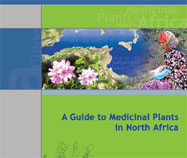 The IUCN and the Swiss Agency for Development and Cooperation are partners in promoting the conservation of diversity in North Africa. Their work is channelled through a programme initiated in 1994 to encourage the sustainable use of natural resources, train local communities, in particular women, in biodiversity conservation, and create a platform for experience sharing and knowledge and information exchange. The last phase of the North Africa Biodiversity Programme (NABP), implemented by the Centre for Mediterranean Cooperation along with state institutions and IUCN members in Algeria, Egypt, Libya, Morocco and Tunis, was funded by the Swiss Agency for Development and Cooperation. The IUCN and the Swiss Agency for Development and Cooperation are partners in promoting the conservation of diversity in North Africa. Their work is channelled through a programme initiated in 1994 to encourage the sustainable use of natural resources, train local communities, in particular women, in biodiversity conservation, and create a platform for experience sharing and knowledge and information exchange. The last phase of the North Africa Biodiversity Programme (NABP), implemented by the Centre for Mediterranean Cooperation along with state institutions and IUCN members in Algeria, Egypt, Libya, Morocco and Tunis, was funded by the Swiss Agency for Development and Cooperation.
As a result of the programme, a guide to the medicinal plants of North Africa has been published and a data base has been set up. The data base is a compendium of scientific information on more than a hundred species of plants, classified according to their medicinal and aromatic properties. These two new products concluded this phase of the Biodiversity Programme for North Africa. |
|
|
| |
|
| Mediterranean results |
Knowledge concerning Mediterranean biodiversity, ecosystems and natural resources is improved and communicated and their conservation promoted, including in the Deep and High Seas.
Cultural and traditional practices for conserving biodiversity and maintaining livelihood security is better understood.
Strategies for better incorporating the gender perspective into policies, programmes and projects for sustainable natural resource management in the Mediterranean are developed and disseminated |
|
|
|
| |
|
| |
|
| |
|
|
|
Assessment and Provision of Environmental Flows in Ephemeral Rivers: Compilation of research and practice in the Mediterranean
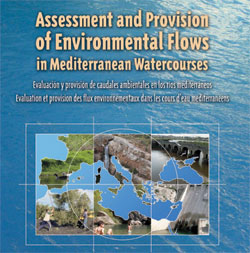 In September 2005, a project was submitted to the European Commission’s 6th Framework Programme for Research, Technological Development and Demonstration Activities whose philosophy is to develop the concepts and tools of 'Environmental Flows' as one stage in the process of reforming water management. The project will help communities to meet the challenges of scarcity of water and unsustainable practices, and prevent these factors from undermining economic development and welfare improvements. In September 2005, a project was submitted to the European Commission’s 6th Framework Programme for Research, Technological Development and Demonstration Activities whose philosophy is to develop the concepts and tools of 'Environmental Flows' as one stage in the process of reforming water management. The project will help communities to meet the challenges of scarcity of water and unsustainable practices, and prevent these factors from undermining economic development and welfare improvements.
Also linked to the subject of 'Environmental Flows', an information paper has been published on 'Assessment and provision of environmental flows in Mediterranean water courses', containing information on emerging methods and practices in the assessment of environmental flows in the Mediterranean. The paper targets actors involved in environmental flows including politicians, water users, wetland and conservation managers, dam operators, water basin operators, non-governmental organisations and representatives of civil society. |
|
|
| |
|
| Mediterranean results |
Knowledge concerning Mediterranean biodiversity, ecosystems and natural resources is improved and communicated and their conservation promoted, including in the Deep and High Seas.
Integrated water catchments management is promoted in the region |
|
|
|
| |
|
| |
|
| |
|
|
|
Contribution of IUCN-Med to the Rabat Forum: challenges for Mediterranean forests
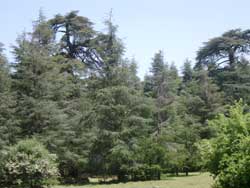 Adaptation to climate change and restoration of forest landscapes were identified as the main challenges confronting Mediterranean forests, and a priority to be taken on board by actors in the region working within the forest environment. This was the recommendation of the Rabat Forum in November 2005, attended by more than 120 managers, experts and researchers from Mediterranean countries and regional and international organisations. IUCN-Med contributed its international experience at this Forum as a member of the Management Committee of Silva Mediterranea, the FAO’s Committee on Mediterranean Forestry Questions. The Forum’s conclusions and recommendations were reported to the 19th Session of Silva Mediterranea, and were adopted as an integral part of its Working Programme. This will provide a common working framework for the Mediterranean countries, and a series of recommendations for the sustainable management of its forests. Adaptation to climate change and restoration of forest landscapes were identified as the main challenges confronting Mediterranean forests, and a priority to be taken on board by actors in the region working within the forest environment. This was the recommendation of the Rabat Forum in November 2005, attended by more than 120 managers, experts and researchers from Mediterranean countries and regional and international organisations. IUCN-Med contributed its international experience at this Forum as a member of the Management Committee of Silva Mediterranea, the FAO’s Committee on Mediterranean Forestry Questions. The Forum’s conclusions and recommendations were reported to the 19th Session of Silva Mediterranea, and were adopted as an integral part of its Working Programme. This will provide a common working framework for the Mediterranean countries, and a series of recommendations for the sustainable management of its forests.
|
|
|
| |
|
| Mediterranean results |
Synergies among different international agreements and processes, particularly with respect to issues such as forest protected areas, forest landscape restoration, community involvement in forest management, forest fires and forest law enforcement and governance are identified to support decision-making.
A technical bridge between global processes and the Mediterranean region is developed to guide policy making |
|
|
|
| |
|
| |
|
| |
|
|
|
Mediterranean Strategy for Sustainable Development: Birth of a Key Regional Sustainability Tool
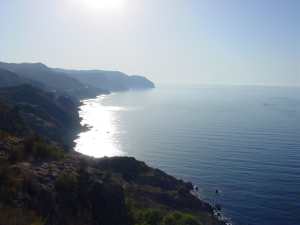 Following a proposal from the Mediterranean Commission on Sustainable Development (MCSD) and a resolution of the Contracting Parties, the Mediterranean Action Plan (MAP) has completed its preparatory work on the Mediterranean Strategy for Sustainable Development. The Strategy is the result of a series of consultative meetings on conservation and sustainable development issues between collaborators and parties involved in the Mediterranean, including governments, civil society and international organisations active in the region. It was adopted by the consultative organ of the UNEP/GEF on 22 June, and by the 22 contracting parties to the Barcelona Conference convened at the 14º conference of the UNEP at Portoroz, Slovenia (8 - 11 November 2005). The World Conservation Union's Centre for Mediterranean Cooperation has become involved in the consultation process, and is also identified itself as a regional associate to support the implementation of the Strategy. Following a proposal from the Mediterranean Commission on Sustainable Development (MCSD) and a resolution of the Contracting Parties, the Mediterranean Action Plan (MAP) has completed its preparatory work on the Mediterranean Strategy for Sustainable Development. The Strategy is the result of a series of consultative meetings on conservation and sustainable development issues between collaborators and parties involved in the Mediterranean, including governments, civil society and international organisations active in the region. It was adopted by the consultative organ of the UNEP/GEF on 22 June, and by the 22 contracting parties to the Barcelona Conference convened at the 14º conference of the UNEP at Portoroz, Slovenia (8 - 11 November 2005). The World Conservation Union's Centre for Mediterranean Cooperation has become involved in the consultation process, and is also identified itself as a regional associate to support the implementation of the Strategy.
|
|
|
| |
|
| Mediterranean results |
Implementation of the Rio Conventions and other international agreements (Bern Convention, Ramsar, CMS, CITES…) is supported in the region and synergies that promote their implementation identified.
Multi-country / transboundary actions for biodiversity conservation are supported |
|
|
|
| |
|
| |
|
| |
|
|
|
Agreement IUCN-Barcelona Convention
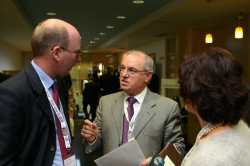 From 7 to 11 November, the contracting parties to the Barcelona Convention held their 14th conference in Slovenia. Among the topics considered at the meeting were the external assessment of the Mediterranean Action Plan, the future of the monk seal, the development of a new protocol on the management of coastal areas, and the acceptance of a Mediterranean Strategy for Sustainable Development. The World Conservation Union (IUCN) signed a new agreement with the Mediterranean Action Plan to provide a framework for cooperation and work for the period 2006-2009. Areas of mutual interest were identified, including the designation and management of protected areas, aquaculture and the environment; also touched on were cooperation in maritime traffic and biodiversity and progress towards the implementation of the resolutions of the World Nature Congress. From 7 to 11 November, the contracting parties to the Barcelona Convention held their 14th conference in Slovenia. Among the topics considered at the meeting were the external assessment of the Mediterranean Action Plan, the future of the monk seal, the development of a new protocol on the management of coastal areas, and the acceptance of a Mediterranean Strategy for Sustainable Development. The World Conservation Union (IUCN) signed a new agreement with the Mediterranean Action Plan to provide a framework for cooperation and work for the period 2006-2009. Areas of mutual interest were identified, including the designation and management of protected areas, aquaculture and the environment; also touched on were cooperation in maritime traffic and biodiversity and progress towards the implementation of the resolutions of the World Nature Congress.
|
|
|
| |
|
| Mediterranean results |
Development and implementation of Barcelona Convention provisions on biodiversity and resource use are supported
|
|
|
|
| |
|
| |
|
|
|